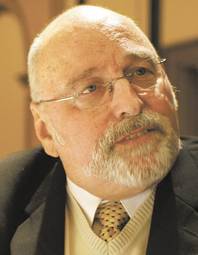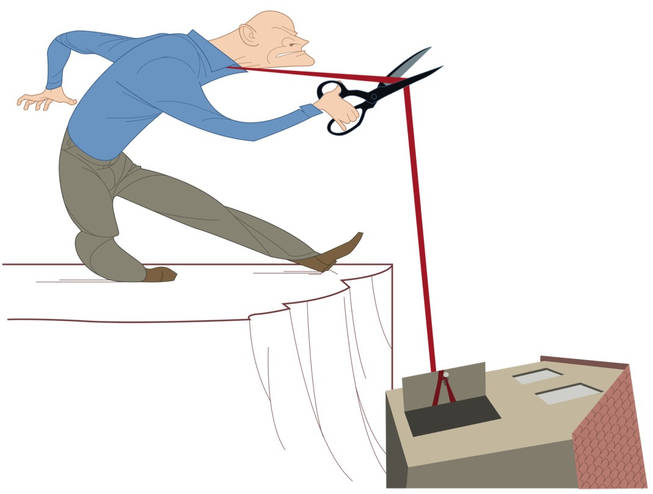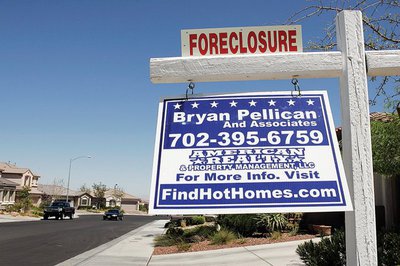Friday, Sept. 3, 2010 | 2 a.m.

Steve Bottfeld

Dennis Smith
Sun Coverage
Sun archives
- Analysts disagree on falling house prices (8-6-2010)
- From building boom to recessionary bust, local real estate market was a wild ride that went south (6-11-2010)
- Tax credit’s effect peters out, pointing to a lull in housing sales (5-13-2010)
- Bank foreclosures, delinquent mortgages continue to rise (5-12-2010)
- Tax credit’s end fails to help Las Vegas home sales (5-10-2010)
- Housing market awaits impact of tax credit’s expiration (5-7-2010)
- Las Vegas has more than its share of troubled properties (5-7-2010)
- Las Vegas posts nation’s highest metropolitan foreclosure rate (4-28-2010)
- Report: Decline in Las Vegas home prices slows (4-27-2010)
The news is bad enough that three homeowners out of four in the Las Vegas Valley owe more on their houses than they’re worth.
And there’s no comfort in the prediction that the local real estate market won’t recover for years.
For those two reasons, hushed discussions can be heard around the office water cooler, between spouses over dinner and at offices of lawyers and financial planners:
We can afford the mortgage payments, but the home value is far below the outstanding mortgage balance. So should we walk away from our home and stop pouring good money after bad? Just cry uncle and let the bank have it? Stop paying the mortgage, pay a lot less rent for a home just as nice, take the credit hit, start over and move beyond the American dream-turned-nightmare?
Real estate experts say they expect to see more so-called strategic foreclosures in coming months.
But it comes at a risk.
Lenders holding the first mortgage have up to six months from the foreclosure to track you down and take you to court for running away from your mortgage. Holders of second mortgages have up to six years to pursue the defaulting homeowner.
Many underwater homeowners think there is a safe alternative in pursuing short sales, in which banks agree to allow the home to be sold at a price less than what is owed on the mortgage. But there is a huge asterisk: Unless the lender agrees in the sales contract to not go after the bailing homeowner for the unpaid principal, it has up to six years to try to recoup its loss from the beleaguered seller. The lender might not want to hold on to the mortgage for that long — and choose to sell it at a discounted price to a collection agency, which can come knocking years later.
Foreclosures outnumber short sales, and most foreclosed homeowners had little choice because of changes in their economic condition, including, most obviously, a loss of job or reduced hours.
But many homeowners are still working and fully able to pay their mortgage — but don’t see the economic sense in doing so.
Seventeen to 25 percent of Las Vegas’ underwater homeowners have considered, or would consider, walking away from their homes as a strategic financial decision even though they can afford to pay their mortgages, according to two studies — one by the University of Chicago and the other by the University of Arizona.
The potential for an increased number of strategic foreclosures is obvious in the numbers:
CoreLogic, a business information and analysis firm, reported that 21 percent of Las Vegas mortgage loans in June were 90 days or more delinquent, up from 13 percent in January 2009, setting up the possibility that foreclosures will increase and with that, the number of strategic defaults.
The Federal Reserve says strategic defaults are typically triggered when the amount owed on a home exceeds its value by 62 percent — suggesting that Nevada is at greater risk than most states at such defaults.
Rick Sharga, an executive vice president with RealtyTrac, a California firm that tracks foreclosures nationwide, said conditions are especially ripe in the Las Vegas marketplace for a higher-than-average number of people choosing strategic defaults, given the significant loss of real estate value over the past two years.
In Las Vegas, which leads the nation in foreclosures, housing has lost 60 percent of its value since the market peaked in 2006.
“The real question about Vegas is how much damage is left to be done,” Sharga said. “You have been No. 1 in the country for two years, and if there aren’t that many homes left to be foreclosed on, maybe people walking away won’t be so bad.”
Tisha Black Chernine, a Las Vegas real estate attorney with Black & LoBello, said she expects strategic defaults to be the third wave of the foreclosure crisis that started in 2007 when homeowners with adjustable-rate mortgages saw monthly payments rise to the point they could no longer afford them. The second wave came when people lost jobs or income, making it difficult to afford their homes.
Strategic defaults may be minimized if banks show more willingness to reduce homeowners’ principals by a substantial amount or approve short sales.
But unless lenders are willing to negotiate with underwater homeowners, the sellers continue to face risks.
“People should be a lot more concerned about that than they are,” Black Chernine said. Under a change in state law, lenders of homes bought since October can’t come after homeowners, she said.
Nevada law, before its change in 2009, allowed lenders holding the first mortgage to come after homeowners who bought homes before October for the balance due on their loan up to six months after the home is foreclosed upon, Black Chernine said. Many of the large banks haven’t come after borrowers because of the volume of foreclosures, but the smaller community banks have done so, she said.
Homeowners with second mortgages face greater risks: State law allows those lenders to seek payment for the deficiency for up to six years because, unlike the first lender, they don’t have possession of the property to recoup some of their losses, Black Chernine said. She envisions a scenario in which lenders holding those second mortgages sell them to collection companies, which may seek to collect in the future.
“There is a lot of residual value in those loans,” Black Chernine said. “I don’t think people could realize what can happen to them.”
Most strategic defaults are occurring on million-dollar properties that have fallen in value by a third or more, said Steve Bottfeld, executive vice president of Marketing Solutions and an analyst of the Las Vegas housing market.
“Strategic defaults are for people who have money and not people who are broke,” he said.
Homeowners who allow homes to go to foreclosure take a hit on their credit report for up to seven years, but many experts said that with so many facing the problem across the country, banks will be more lenient and could extend credit in two to four years so they don’t lose so much potential business, especially if customers make a down payment. Otherwise, becoming creditworthy could take up to five years.
Underwater homeowners typically try in earnest to work something out with their lenders — and walk away only after their lenders have refused to offer them a meaningful loan modification, said Brent White, a law professor at the University of Arizona.
“This is often necessary because most lenders simply won’t talk to underwater homeowners about a loan modification as long as they are current on their payments,” White said. “Of course, for strategic default to work as a negotiating strategy, you have to be willing to take the credit hit and to ultimately walk away if necessary. Most underwater homeowners are shamed and scared by their lenders, the government and the media into never taking this step.”
Lenders could limit the tide of strategic foreclosures by reducing mortgage payments to amounts more in line with the cost of rent for a similar home, White said.
White disagrees with those who argue that homeowners have signed contracts and would be morally wrong to walk away from a home that they can still afford to pay on.
White said homeowners — whether wealthy or middle class — should act in their best interest, just as banks act in their self-interest. The world will not end, nor will the economy collapse, if more homeowners strategically default.
To the contrary, homeowners freed from their negative equity might begin to spend again, helping to spur the economy toward recovery. And once the housing market hits bottom, homes can start to appreciate again, White said.
“Some economists say that putting the burden of the housing collapse on the backs of homeowners is economically inefficient, and that it would be beneficial for the economy and the housing market if more people defaulted,” White said.
Dennis Smith, president of Las Vegas-based Home Builders Research, said he would consider a strategic foreclosure, given the steep drop in values and unwillingness of banks to sufficiently modify loans, especially because the stigma attached to foreclosures is lessening.
“People have to do what is in their best interest and welfare,” Smith said. “I can’t say it is wrong. Would I do it if it involved my family? Heck yes, I would do it. You have to do what is best for you and your family. This is only a five- or seven-year hit on your credit.”



Join the Discussion:
Check this out for a full explanation of our conversion to the LiveFyre commenting system and instructions on how to sign up for an account.
Full comments policy